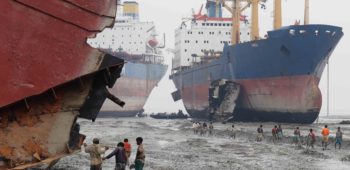A total of 862 ships were dismantled worldwide in 2016, the vast majority of which ended up in South Asia on the beaches of India, Pakistan, and Bangladesh, the NGO Shipbreaking Platform said Wednesday.
The Platform, which has compiled and analysed a comprehensive list of all ships dismantled worldwide, said the figures show no sign that the shipping industry has improved its management of end-of-life vessels. In 2016, a total of 668 vessels were broken on tidal beaches of South Asia, which is as much as 87% of all tonnage dismantled globally, the Platform said.
European ship owners topped the list of global dumpers in 2016, the Platform said, with Greece and Germany sending the most ships to be dismantled on “polluting and unsafe” South Asia beaches.
The NGO Shipbreaking Platform, created in 2005, is coalition of environmental, human and labour rights organizations whose goal is to prevent toxic end-of-life ships from being beached in developing countries, particularly in South Asia where ships are dismantled within the tidal zone.
“The shipping industry is nowhere close to ensuring sustainable ship recycling practices. Last year, we saw not only an increase in the market share for dangerous and dirty shipbreaking, but also a record-breaking number of EU-owned vessels on the South Asian beaches. A jaw-dropping 84% of all European end-of-life ships ended up in either India, Pakistan or Bangladesh. Beaching yards are not only well known for their failure to respect international environmental protection standards, but also for their disrespect of fundamental labour rights and international waste trade law,” says Patrizia Heidegger, Executive Director of the Platform.
The Platform also tracked accidents and fatalities as best they could. The Platform said 2016 saw the worst catastrophe in the history of the industry in November when at least 28 workers were killed and more 50 suffered injuries when a tanker beached in Gadani, Pakistan exploded and caught fire. The Platform said it also documented 22 fatalities and 29 serious injuries in Bangladesh yards in 2016. In Alang, India, the Platform said it was informed of at least two fatal deaths, although accident records in Indian shipbreaking yards are kept secret, it notes.
Overall, the dismantling of ships accelerated last year amid pressure to scrap due to prolonged low freight rates and too many ships, particularly among container ships and bulk carriers. In 2015, just 768 large ocean-going vessels were sold to the scrap yards last year, including 469 which were broken on beaches in South Asia.
“It is scandalous that the burden to deal with Europe’s profit-greedy shipbuilding boom is shifted to communities and workers in South Asia: first the shipping industry creates a large overcapacity on the market, and then it fails to find responsible solutions for its obsolete ships,” says Heidegger.
One of the most talked-about shipbreaking stories of 2016 was Maersk Group’s decision to once again send end-of-life vessels to Alang for recycling, but only to specific yards complying with company’s internal policies as well as standards set forth in the upcoming Hong Kong Convention, aimed at ensuring that ships due for recycling do not pose any unnecessary risk to human health and safety or to the environment. At the time of its decision Maersk said it could save $1 million to $2 million dollars per ship by sending them to Alang, where Maersk argues that its investment will improve conditions and provide the shipping industry with more scrapping capacity.
“This move to boost profits does not only help to rubberstamp the beaching method, but, very regrettably, it is also stalling real progress and innovation in India to move ship recycling to the next level – off the beach – to modern ship recycling facilities,” argues Heidegger.
At least five yards located in Alang are now fully compliant with the Hong Kong Convention, and the number seems to be increasing.
The NGO Shipbreaking Platform is particularly critical of ship owners’ continued use of cash buyers for end-of-life vessels and the practice of reflagging end-of-life vessels to flags of convenience.
“Looking at the flags used at end-of-life, it is clear that legislation based on flag state jurisdiction will not be able to bring substantial change to the current practices: who believes that a non-compliant flag and a cash buyer benefitting from the worst conditions will enforce improvements in shipbreaking yards?,” says Ingvild Jenssen, Policy Director and founder of the Platform. “The global shipbreaking crisis can only be solved through measures that go beyond flag state jurisdiction. That is why we call on the EU to demand a ship recycling licence from all vessels visiting EU ports.”
In late December, the European Commission published and adopted its first version of the long-awaited European List of approved ship recycling facilities, which will have exclusive access to EU-flag ships being sent for scrap as required under the EU Ship Recycling Regulation, entering into force no later than December 31, 2018. The first version of the list however only included 18 located in Europe only. The European Commission plans to expand the list to include non-EU yards later this year, but the big question is whether or not the the EC will include yards where the beaching method is still used.
As the Platform points out however, European ship recycling facilities dismantled small-size vessels in 2016, with just 22 vessels totaling 38,839 gross tonnes scrapped. Meanwhile India scrapped the most ships in 2016 (306), but Bangladesh broke most in terms of gross tonnage, indicating that it was the preferred destination for the larger vessels.
Copyright Ships & Ports Ltd. Permission to use quotations from this article is granted subject to appropriate credit given to www.shipsandports.com.ng as the source.
